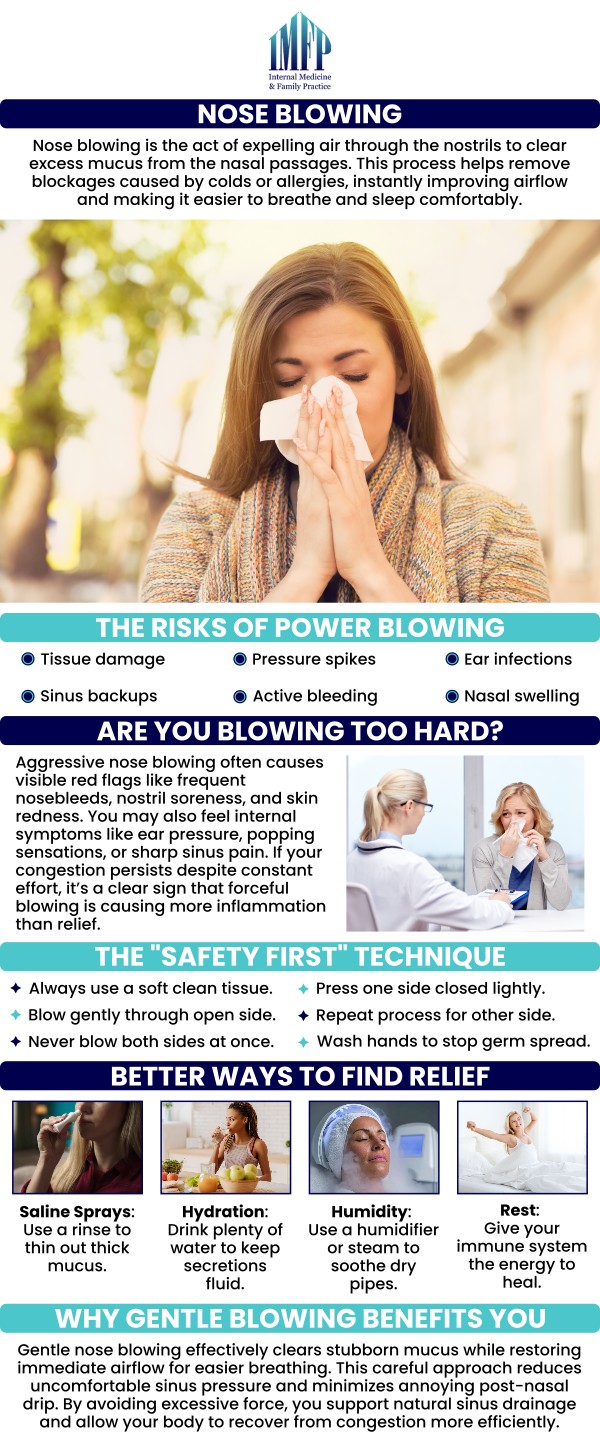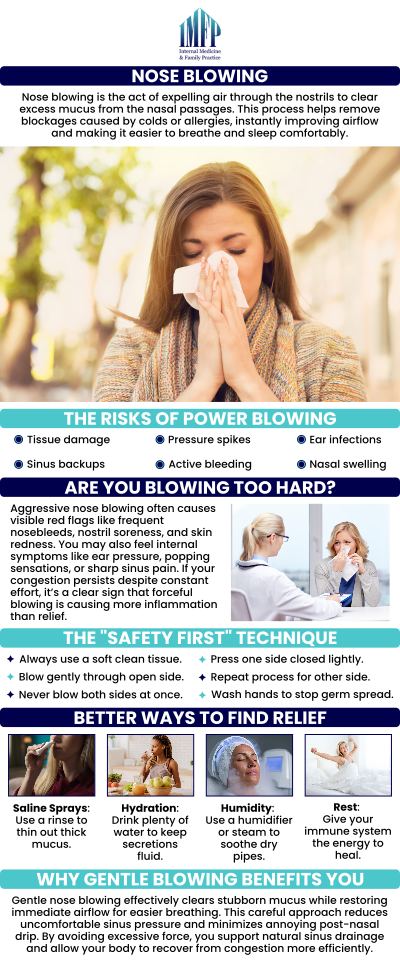Does blowing your nose make cold symptoms worse?
When you have a cold, blowing your nose may temporarily relieve congestion, but it can also irritate your nasal passages and make symptoms worse in some cases. At Internal Medicine and Family Practice, Dr. Wael Mctabi and Dr. Samiullah Choudry provide expert advice on managing cold symptoms, helping you understand when it’s best to blow your nose and when to let it be. For more information, contact us or schedule an appointment online. We are located at 1719 Glenwood Ave, Joliet, IL 60435.




Table of Contents:
Can blowing your nose too often make cold symptoms worse?
How does blowing your nose affect congestion during a cold?
Can blowing your nose cause ear pressure or discomfort during a cold?
Does blowing your nose lead to more mucus production when you’re sick?
Why Our Family Practice is the Best for Common Cold Treatment?
Frequent nose blowing during a cold can sometimes intensify irritation in the nasal passages. The repeated pressure can inflame delicate tissues, making the nose feel raw or sore. This irritation does not necessarily prolong the viral infection itself, but it can make the symptoms feel more severe and pronounced, especially if the individual is already experiencing congestion and sneezing. Excessive nose blowing may also push mucus deeper into the sinuses, which can contribute to discomfort or a sense of fullness. While clearing the nasal passages is necessary, moderation allows the sinuses to drain naturally and helps maintain the integrity of the nasal lining. Balancing gentle clearing with other remedies, such as saline sprays, can reduce irritation.
Additionally, the repetitive act of forceful blowing may trigger minor swelling inside the nasal passages. This swelling can lead to temporary blockage, creating the sensation that the congestion is worsening. Understanding the difference between clearing the nose and creating pressure is key to managing symptoms effectively. Managing both the frequency and technique of nose blowing plays a role in comfort during a cold. Gentle methods of blowing one’s nose can preserve the nasal tissues while still providing relief, allowing the body’s natural immune response to work without unnecessary strain on the sinuses.
Blowing the nose helps to temporarily remove mucus from the nasal passages, which can provide a sense of immediate relief. The act clears the airways, making breathing feel easier and reducing the sensation of fullness. However, congestion is a response to inflammation caused by the viral infection, so removing mucus does not eliminate the underlying cause. In certain instances, frequent or forceful nose blowing may lead to compacting mucus back into the sinus cavities. This can create a temporary increase in pressure or a feeling of blocked passages, making the individual perceive that congestion is worsening even though mucus is being cleared. Gentle nose blowing combined with supportive strategies, such as staying hydrated and using saline rinses, can help maintain consistent drainage. These approaches reduce the chance of pushing mucus back into the sinuses and allow the passages to stay open longer.
Overall, blowing the nose can relieve congestion when done carefully. Providers at Internal Medicine and Family Practice can direct patients in managing technique and frequency to prevent added pressure while supporting natural mucus movement, which helps the body recover efficiently during a cold.
The connection between the nose and ears through the Eustachian tubes means that forceful blowing can transmit pressure into the middle ear. This can create a sensation of fullness, popping, or mild discomfort, particularly if congestion is already present in the nasal passages. The individual may notice temporary changes in hearing or a feeling of pressure behind the eardrum. Gentle nose blowing is essential to prevent forcing mucus or air upward into the Eustachian tubes. Aggressive attempts to clear the nose can push fluid or inflammation into these narrow passages, sometimes leading to discomfort or even temporary ear congestion.
For patients with persistent ear pressure, techniques such as yawning, swallowing, or using a saline spray can help equalize the pressure without adding strain. Maintaining proper hydration also supports mucus thinning, which eases natural drainage from the middle ear. Providers can direct patients toward a myriad of additional relief techniques for cold symptoms to help avoid instances of excessive nose blowing. Managing ear discomfort during a cold involves a combination of balancing mucus clearance with careful attention to pressure. Thoughtful nose clearing minimizes ear strain while still addressing nasal congestion effectively.
Blowing the nose does not inherently trigger the body to produce more mucus. Mucus production is controlled by the immune system as a response to the viral infection. However, frequent irritation from forceful blowing can inflame nasal tissues, which may make the passages feel wetter or more congested, giving the impression of increased mucus. The impression of extra mucus often comes from swelling and inflammation in the nasal lining. The nasal tissues may, in some instances, respond to irritation by producing additional fluid locally, but this is a protective mechanism rather than an overproduction caused by the act of blowing itself.
Using gentle techniques and supportive remedies, rather than relying on forceful and frequent nose blowing, such as saline sprays, humidifiers, or warm compresses, can reduce irritation and help maintain natural mucus consistency. This approach ensures that clearing the nose remains effective without inadvertently intensifying the feeling of congestion. Careful attention to technique allows the individual to manage nasal passages effectively. While blowing the nose is necessary for relief, moderation and gentle methods prevent extra irritation and support a smoother recovery from cold symptoms.
At our family practice, we specialize in providing compassionate, effective care for common cold symptoms, with a personalized approach to ensure rapid relief and recovery. Led by Dr. Samiullah Choudry, an experienced Internal Medicine and Family Practice physician, we understand that every patient’s needs are unique, which is why we take the time to assess symptoms thoroughly and offer tailored treatment plans.
● Expert Care: Dr. Choudry brings years of experience in diagnosing and treating common colds, ensuring that you receive the most effective treatment for your symptoms.
● Comprehensive Treatment: We offer a range of treatments, from over-the-counter medications to natural remedies, all aimed at providing relief and speeding up your recovery.
● Personalized Approach: Each patient is treated as an individual, with Dr. Choudry creating treatment plans that focus on their unique health needs.
● Preventive Guidance: We provide education on preventing future colds and managing symptoms to reduce the risk of complications.
Whether it’s managing a simple cold or addressing more complex symptoms, our family practice ensures you receive the highest quality care in a comfortable and supportive environment.
Cold treatment is available at Internal Medicine and Family Practice. For more information, contact us or schedule an appointment online! We are conveniently located at 1719 Glenwood Ave Joliet, IL 60435. We welcome walk-ins! We serve patients from Joliet IL, Plainfield IL, Lockport IL, Channahon IL, Romeoville IL, Manhattan IL and surrounding areas.
Check Out Our 5 Star Reviews








